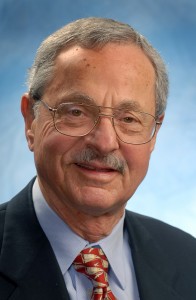Three-Part Series on Media to Be Offered in New York This Summer
Columbia, Mo. (May 25, 2007) — The Missouri School of Journalism will present in June a three-part series on the changing nature of media as part of its New York Program.

The panels will discuss the changing face of broadcast and cable news, the future role of newspapers in disseminating information and a look at how political advertising shapes campaign discussions.
Based in Manhattan, the New York Program enrolls 20 students who work in full-time internships in all areas of journalism and strategic communication. ABC News, FOX News, Harper’s Bazaar, Men’s Journal and Phear Creative are some of this year’s sites. A course, Today’s Changing Journalism, complements the panels and the on-the-job learning experiences. Stuart Loory, the Lee Hills Chair in Free Press Studies at the School, will teach the class and direct the program.
All panels will be held in Swayduck Auditorium at The New School, 65 Fifth Ave. (between 13th and 14th streets). General admission tickets can be purchased at the box office up to one hour before the event. Cost is $20 for the series or $10 for each event. The panels are free for students with a valid ID. There is no reserved seating.
An overview of the panels follows.
The Changing Face of Cable and Broadcast News
- 7 p.m., Tuesday, June 12
- Are cable and broadcast news obsolete? Can they save themselves from the clutches of pop culture and survive to keep the public well informed?
- Moderator:
- Stuart H. Loory, Lee Hills Chair in Free Press Studies, Missouri School of Journalism
- Panelists:
- Marlene Sanders, retired news correspondent, writer, producer and news executive with ABC and CBS News
- William Small, chairman, News and Documentaries Emmy Awards, National Television Academy
- Richard Roth, United Nations correspondent, CNN
Will Newspapers Become Information Geysers?
- 7 p.m., Tuesday, June 19
- What will newspapers of the future be like and where must one go to find them? Will they be on the doorstep in the morning or only on the computer, cell phone and iPod screens 24/7? How will their role in society change?
- Moderator:
- Stuart H. Loory, Lee Hills Chair in Free Press Studies, Missouri School of Journalism
- Panelists:
- William E. Casey Jr., vice president of special editions, The Wall Street Journal
- Seymour Topping, BJ ’43, former foreign correspondent, foreign editor, managing editor and regional editorial director, The New York Times
- Vivian Schiller, senior vice president and general manager, NYTimes.com
- James F. Hoge, Jr., editor and the Peter G. Peterson Chair, Foreign Affairs magazine
Should Political Advertising Have a Future?
- 7 p.m., Tuesday, June 26
- With each new election campaign season, political advertising becomes more dominant. One implication is that the candidate who raises the most money can dominate television screens, the Internet, front yards or the printed page with ads that sell an image with the same techniques that sell beer, sleeping pills or lingerie to the public. Is freedom of choice being jeopardized by the drumbeat? Is freedom of expression stifled by the inability of the public to talk back to an advertisement? Are election campaigns growing too negative?
- Moderator:
- Stuart H. Loory, Lee Hills Chair in Free Press Studies, Missouri School of Journalism
- Panelists:
- Hank Sheinkopf, founder, Sheinkopf Communications, New York
- Others to be announced
For more information about the panels or the New York Program, please contact the Study Abroad office.
Updated: April 17, 2020